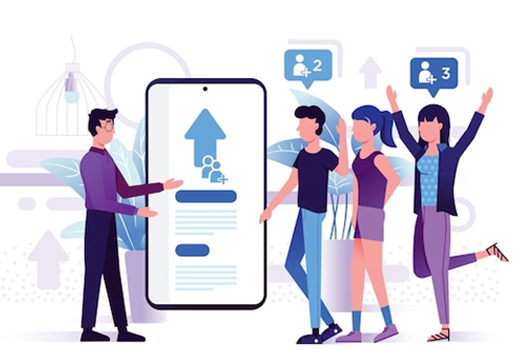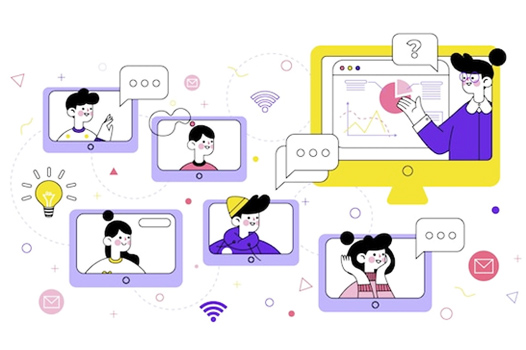The Future of Leadership Is Here, And It’s Not What You Think
by Mentoring Matters
4 minutes read
A few years ago, leading a team meant walking into an office, reading the room, and making decisions in real time. Conversations happened in hallways, trust was built over coffee breaks, and leadership was often as much about presence as it was about performance.
Today? Leadership looks nothing like that.
Meetings are virtual, decisions are data-driven, and engagement happens across screens. Some of the best people on your team might be working from a different time zone or logging in from their dining table between school drop-offs. The workplace has evolved. But has leadership evolved with it?
In conversations with leaders, I hear the same concerns over and over again:
• “How do I build trust when I barely see my team?”
• “How do I ensure productivity without micromanaging?”
• “How do I balance digital efficiency with the human connection my team needs?”
What they’re really asking is: How do I lead in a world where I’m not physically present?
The answer isn’t learning more tech tools. It’s learning how to lead differently.
And that’s where coaching comes in.
Digital Leadership Isn’t About Tools, It’s About Fluency

There’s a misconception that digital fluency is about mastering the latest collaboration platforms or AI-driven analytics. But leaders don’t need to become tech experts. They need to become digitally fluent, understanding how technology, people, and strategy intersect to drive results.
Yet, many leaders struggle because their leadership skills were built in a pre-digital world. They know how to engage in person, read the room, and lead through presence. Now, they’re being asked to engage remotely, lead through influence, and build culture in a hybrid workplace, without a playbook.
That’s why digital fluency isn’t just a technical skill. It’s a leadership mindset.
Where Leaders Struggle, And How Coaching Helps
1. From Managing by Presence → To Leading by Influence
In a remote world, visibility isn’t about showing up in an office, it’s about showing up where it matters. Great leaders don’t manage hours; they inspire outcomes.
Coaching helps leaders shift from time-based leadership (watching who is online) to trust-based leadership (empowering teams to deliver results). It teaches them how to foster accountability without micromanaging, replacing outdated "butts in seats" thinking with a focus on impact.
2. From Gut Instinct → To Data-Driven Decision-Making
Leaders today have access to more data than ever before, but data without strategy is just noise. The ability to interpret insights, act decisively, and balance data with intuition is now a leadership must-have.
Coaching equips leaders to filter through the noise, identify what truly matters, and make informed decisions without feeling overwhelmed by analytics.
3. From Talking at Teams → To Engaging in a Digital World
The best leaders know that communication isn’t about talking, it’s about connection. And in a digital workplace, how you connect matters just as much as what you say.
Coaching helps leaders adapt their communication style for remote environments, mastering clarity in asynchronous messaging, presence in virtual meetings, and engagement in hybrid interactions.
4. From Reacting to Change → To Building a Future-Ready Mindset
Digital transformation isn’t a one-time shift; it’s an ongoing reality. Leaders who wait for stability will never find it. The future belongs to those who embrace adaptability as a leadership skill.
Coaching strengthens a growth mindset, helping leaders lean into change rather than resist it. Instead of fearing new technology, they learn how to harness it to amplify human connection and business success.
5. From Individual Performance → To Digital-First Team Dynamics

A leader’s effectiveness is no longer measured just by personal performance, it’s measured by how well they enable their teams to succeed in a digital world.
Coaching helps leaders delegate with confidence, create a culture of trust, and ensure their teams feel connected and motivated, even when working remotely.
The Future of Leadership is Digital, But It’s Still Human
Here’s the reality: Technology will keep evolving, but leadership is still about people.
The leaders who will thrive in 2025 and beyond won’t be the ones who master every new platform. They’ll be the ones who master how to lead effectively whether in-person, remote, or somewhere in between.
Coaching is the bridge. It’s what helps leaders develop the adaptability, confidence, and fluency needed to lead in a digital world without losing what makes leadership human.
So, the question isn’t whether digital transformation is happening. It is. The question is:
Are your leaders ready for it?
Let’s start the conversation. Connect with us at information@mentoring-matters.com to explore leadership coaching for the digital age.
- Previous article:
- Next article: